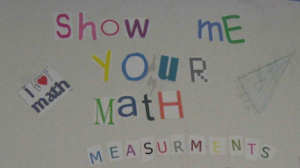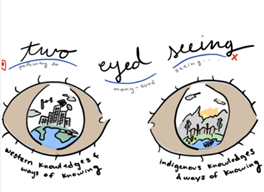Module 2, Post 5
“Show Me Your Math: Connect Math to Our Lives and Communities” compiles the work that is a joint endeavor between St. Francis Xavier University’s Faculty of Education and Mathematics Department and local Mi’kmaw and African Nova Scotian communities. The program invites Aboriginal Students in Atlantic Canada to explore the mathematics that is evident in their own community and cultural practices. Through exploring aspects of counting, measuring, locating, designing, playing, and explaining, students discover that mathematics is all around them and is connected to many of the cultural practices in their own communities. Each year students gather for the annual math fair and celebrate the work they have done.
 While this website contains samples of student SMYM projects, it also includes resources for doing culturally-based inquiry projects, research relating to decolonizing mathematics education for Indigenous students, and information about a related Math Outreach program. All of this work is dedicated to transforming the experiences of Indigenous children and youth in learning mathematics and to increase both student achievement and student affinity for mathematics.
While this website contains samples of student SMYM projects, it also includes resources for doing culturally-based inquiry projects, research relating to decolonizing mathematics education for Indigenous students, and information about a related Math Outreach program. All of this work is dedicated to transforming the experiences of Indigenous children and youth in learning mathematics and to increase both student achievement and student affinity for mathematics.
One page on the website, Connecting Math to our Lives and Communities (CMTOL) is filled with curricular ideas that connect science to our land and current issues such as Invasive Species, Environmental Racism in Nova Scotia, The Mathematics of Food Security, Water Security, Climate Change, Soil Degradation, Soil and Social Justice, Star Stories, and Structures and Engineering, to name a few.
Another webpage includes project-based and inquiry learning through the learning activities that are linked to the land or cultural traditions. The website also includes a few years of archived student projects, such as this one: MathFishing.
I also found “Fostering Mawikinutimatimk in Research and Classroom Practice” (Lunney & Wagner, 2006) that discusses the challenges of mawikinutimatimk – learning together- as related to a mathematics classroom. The report profiles that North American aboriginals have the lowest participation of any cultural group when it comes to mathematics and highlights the importance of educators recognizing the long-term impacts that colonization has had on this segment and seeking solutions that foster higher inclusivity.
References
Lunney Borden, L. (2011, November 14). MathFishing.m4v [Video]. Youtube. https://www.youtube.com/watch?v=T9Fd2OkXCdQ
Lunney, L. A. & Wagner, D. R. (2006). Fostering mawikinutimatimk in research and classroom practice. In Alatorre et al. (Eds.), Proceedings of the Twenty Eighth Annual Meeting of the North American Chapter of the International Group for the Psychology of Mathematics Education. (pp. 505 – 507). Universidad Pedagógica Nacional. http://www.pmena.org/pmenaproceedings/PMENA%2028%202006%20Proceedings.pdf
Show Me Your Math. (n.d.). CMTOLC Outreach Connecting Math to Our Lives and Communities. http://showmeyourmath.ca/outreach/
